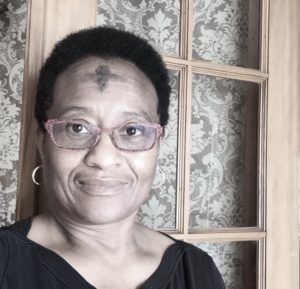Repent and Believe in the Gospel of Love
Dear Ones—
Wednesday was a busy day, with lots to do—preparation for two big meetings and a retreat, little personal errands I couldn’t seem to get done. My head was full, and yet I felt a restlessness, as though I had forgotten something, as though I should have been somewhere but hadn’t yet arrived. I figured I needed a break; I stopped for coffee, and drove to my next appointment by a different route, down an unfamiliar stretch of San Pablo Avenue, one of the streets that connects Berkeley to Oakland.
Stopped at a light on the Berkeley-Oakland border, I saw the church with open doors, draped in hangings of red, black, and green, a huge font in the center hallway. I realized it was St. Columba’s Catholic Church—and that it was Ash Wednesday. I parked my car, responding to the primal memory of childhood, recalling my old practices of being blessed with ashes, of preparing for sacrifice. If the doors were opened, I reasoned, it was likely that a priest might be there; if anyone could use a blessing these days, I thought, that would be me.
Approaching the altar brought tears to my eyes, surfaced a memory of longing for the church I’d left behind, a longing that still is capable of surprising me all these decades later. As I walked in, one of the women helping to decorate the sanctuary asked if she could help me; noticing my tears, she reached out her hand to me. I said I had hoped to receive some ashes, but thought I had missed the priest. “Oh, no, you haven’t, he’s here. Father Aiden, she wants some ashes.” Even as she spoke, I began to realize that I had entered a place that looked nothing like any church I’d ever seen. Every single icon, all the stations of the cross, Mary holding an infant Jesus, Joseph standing watch on the other side of the room—they were all people of color. Interspersed with the iconography were Adinkra symbols from the Akan people of Ghana I gasped with pleasure as I saw over the sanctuary door a giant Gye Nyame symbol, which I had adopted as my personal motto upon ordination; it translates as “except for God, I fear nothing.” The entire room was breathtaking; it was the most Afrocentric space I’d ever seen.
Father Aiden, on the other hand, was Irish, with the brogue to prove it; he  greeted me with a smile. “What’s your name?” he asked. “Rose,” I said, and he reached toward my forehead, and marked it with ashes, and said, “Rose, repent, and believe in the gospel of love.” I had been looking for this, I realized: a chance to be ministered to, someone to help me notice and to mark this time of reflection, a person who did not know me but who saw me as I truly am: a beloved daughter of God.
greeted me with a smile. “What’s your name?” he asked. “Rose,” I said, and he reached toward my forehead, and marked it with ashes, and said, “Rose, repent, and believe in the gospel of love.” I had been looking for this, I realized: a chance to be ministered to, someone to help me notice and to mark this time of reflection, a person who did not know me but who saw me as I truly am: a beloved daughter of God.
Ash Wednesday is meant to be a solemn day, a reminder of our mortality and of the dust to which we ultimately return. But it wasn’t like that for me today, surrounded by portraits of the ancestors and the God of my understanding. The ashes I wore this Wednesday were a talisman of hope, a reminder for my sometimes weary heart that any day is a good day to repent: that is, to turn myself around, and to give myself over to love’s good news. May all of us get that same chance, in this Lenten season: the chance to turn ourselves around. May all of us find reason to believe in love’s amazing power.
Faithfully,
Rosemary
